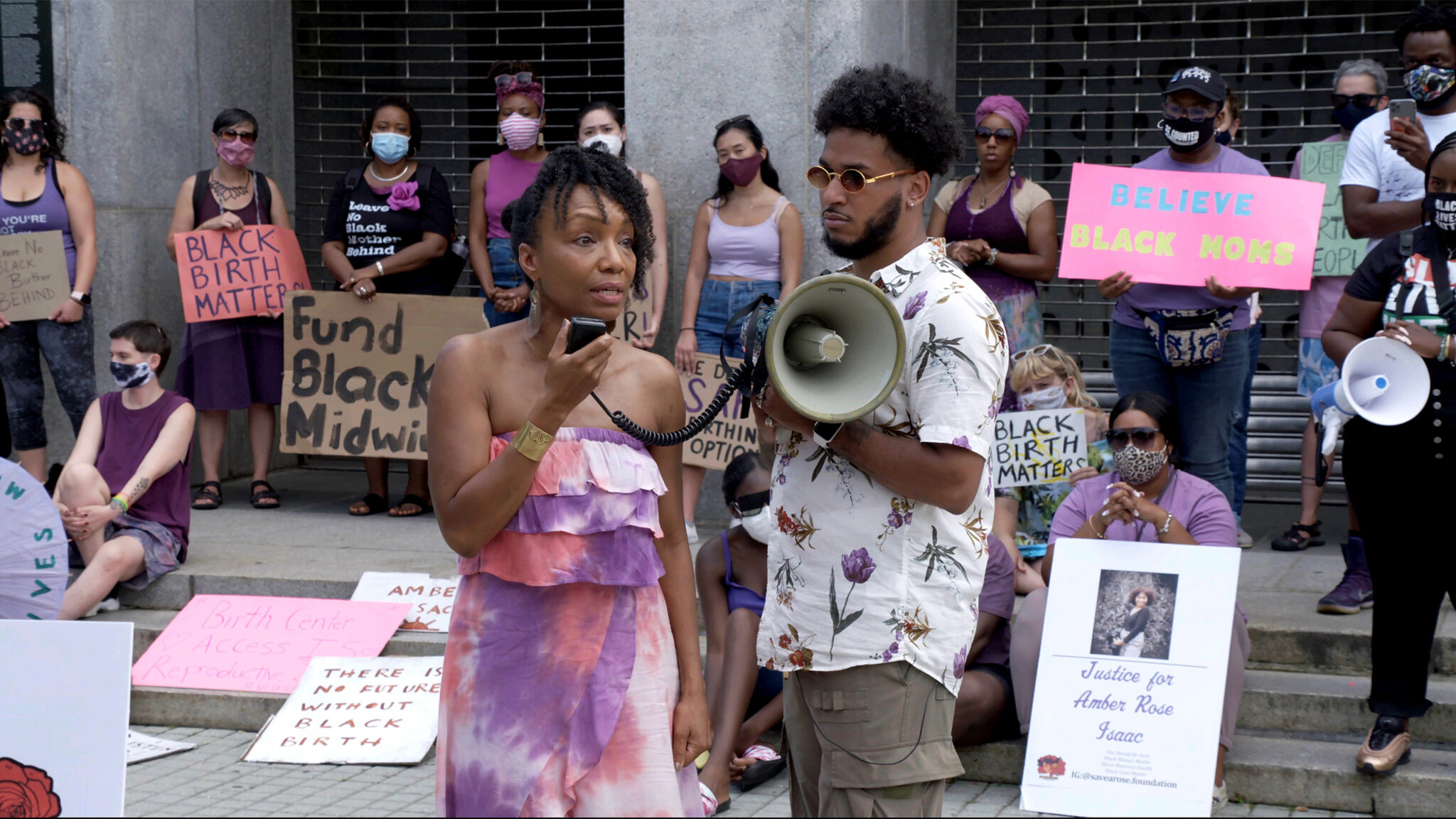By Stephanie Ornelas
“I can lead and grieve at the same time.”
These powerful words spoken by Shawnee Benton Gibson during the 2022 Sundance Film Festival struck a chord with viewers who were curious how she balances grief with action following the sudden death of her young daughter, Shamony Gibson. The subject of the Sundance Film Festival premiere Aftershock, Shamony tragically died 13 days following the birth of her son.
We’re continuing our series on reproductive health and rights, and as we anxiously await Aftershock’s release on Hulu July 19 (read our full recap here), we’re looking back at when Gibson, Shamony’s partner Omari Maynard, and directors Paula Eiselt and Tonya Lewis Lee all came together for the post-premiere Q&A at the Sundance Film Festival back in January. Joined with them was Bruce McIntyre, the partner of 26-year-old Amber Rose Isaac who died due to an emergency c-section. Together they’ve been working to bring awareness to the fact that a disproportionate number of Black women are failed every year by the U.S. maternal health system.

“When you’re talking about an infant’s health, you’re talking about a woman’s health. And we discovered [through making the film] that women weren’t doing so well,” says Lee. “I was talking to a group of women one day and I just heard stories about a friend, a sister, a cousin who had passed away from childbirth complications.”
Prior to creating the film, Eiselt realized that what she went through within the maternal healthcare system was endemic to Black women, who are most profoundly impacted.
“I knew that as an artist, if I wanted to help shed light on the story and the work that’s being done, centering Black women was the only way to do that. It doesn’t work any other way.”
What’s really interesting is how each family member talks about their process of balancing grief while igniting change. When major tragedy strikes, it’s not uncommon for those impacted to demand justice immediately — and those feelings can be amplified when it’s an issue involving human rights, policy and systemic change. It’s something many of us are going through as we process the tragedy in Uvalde, Texas.
During the discussion, Benton, McIntyre, and Maynard all talked about how they find the time to grieve while still raising awareness to the audience that’s now in front of them.
“At my daughter’s homegoing service and at the funeral, people thought I was in shock because of how I was speaking to the audience about the need to take a stand around these issues,” says Benton, who has over two decades of professional experience in the areas of women’s health, birth equity, social justice, grief, loss, and trauma.
“I don’t have time for tears. There are a thousand people in this space. I need to speak about what’s happening and why Shamony died. I don’t have to release my purpose because I lost my daughter. That would be dishonoring her memory. We have a whole community that takes care of me and covers me, that has me pump the brakes when I need to be still.”
And Benton acknowledges that it’s important to take responsibility for your own grief during the process: “The work must continue because I’m a conduit. I’m not the person, I’m a person on this journey and I have to be responsible and accountable for my grief and my leadership.”
While Maynard expresses there are certainly (and understandably) times where he doesn’t feel like going to rallies or group activist meetings, being in that space gives him the energy he lacks at times.
“There are definitely moments where I’ve felt like I don’t have the bandwidth to grieve and just be in a space in which I can hold people up. Because I’m down at this point. But once you get there, it’s a whole experience because you’re feeding off of other peoples’ energy and you’re in a space where you understand that this is a collaborative thing. This is not something that we’re trying to tackle as individuals. So if we create a space in which I can hold you up and it works vice versa, it makes the movement a lot more palatable.”
Echoing Maynard’s words, McIntyre explains how he was immediately moved to act following Isaac’s death, but his desire to spread awareness doesn’t keep him from feeling everything he needs to feel when he’s in those heavy moments of grief. “I jumped into action the very next day after Amber’s passing. I left straight from the hospital and jumped on the computer and started studying and advocating for her. I didn’t really take the proper time to necessarily stop and grieve because I felt like we were running out of time.”
“I felt like I needed to do something in the now, rather than wait. I had a mission and a purpose and I wanted to fulfill that. And within that, I found that speaking to fathers like Omari — and others who have experienced this type of loss — gave me the energy and the fire to really keep going.”
McIntyre continues, “Of course when I’m feeling like I need to take time to myself and grieve, I do that unapologetically. I feel what I need to feel in whatever moment that I’m in. I don’t conceal and I don’t hold anything in. That’s very healing for me. And being surrounded by community and by love and people who are also in this fight with me brings solace.”







